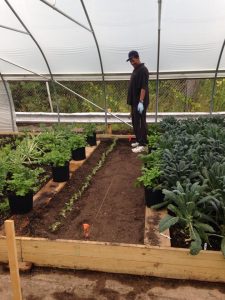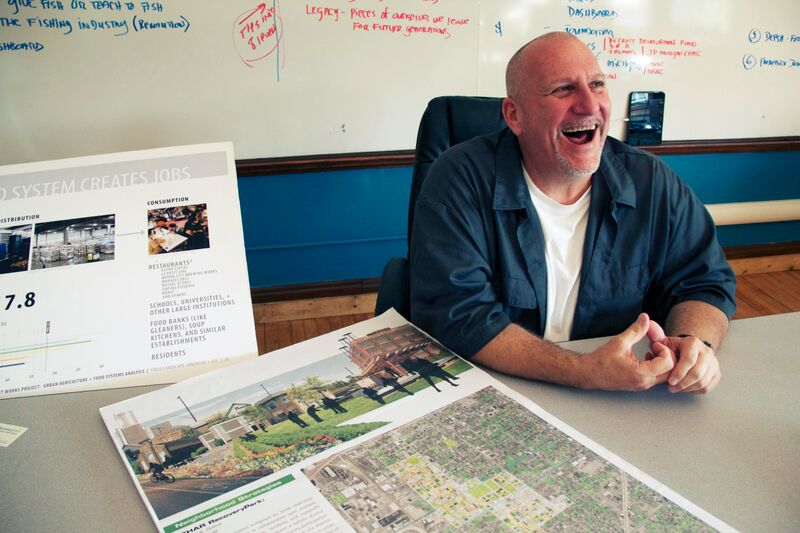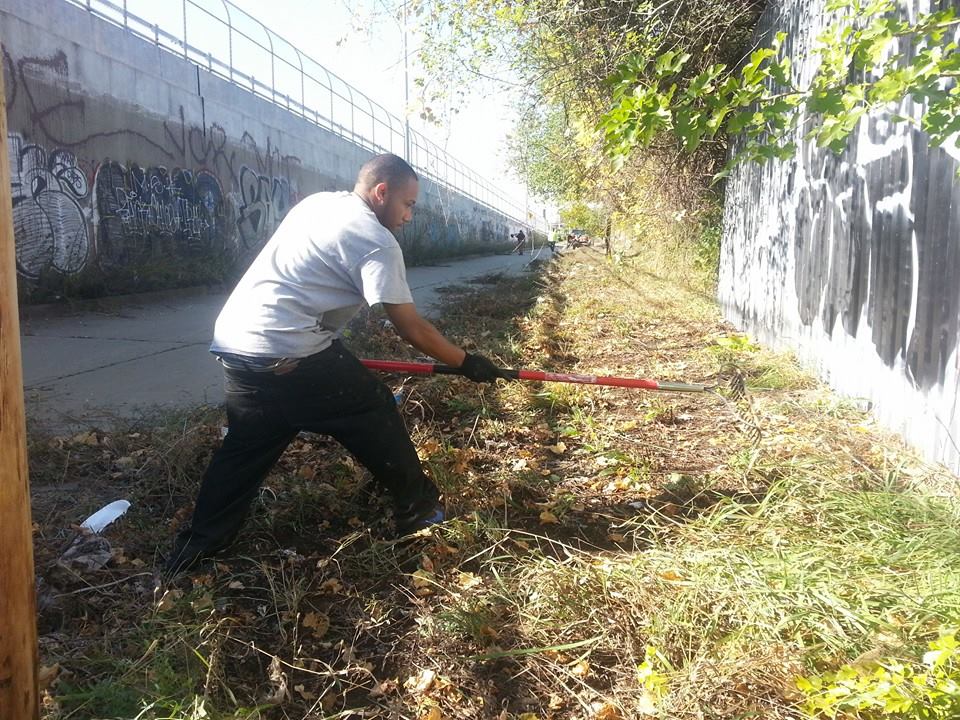A head of lettuce is a high-cost, low- value commodity.
From the moment it’s planted, it requires intensive care, says Gary Wozniak, president and CEO of RecoveryPark. The company grows specialty produce and works to provide sustainable jobs for those facing employment barriers because of addiction or imprisonment.

“If there were a plant hospital, it (lettuce) would be housed in an Intensive Care Unit (ICU),” he jokes.
A single head, which contains virtually no nutritional value and takes a whopping 110 gallons of water to grow, has a mere 24-hour shelf life.
“At that point, it begins to deteriorate rapidly,” says Wozniak. “Even with the best refrigeration and shipping support, it begins to rot almost immediately.”
Although Michigan residents consume lots of lettuce, much of it is not locally grown or produced. The same is true for other produce and that deeply concerns Wozniak.
“We need more nutrient-rich, locally grown produce and the kind of employment opportunities agriculture brings closer to home,” says Wozniak, who questions why we can’t grow what we eat in Detroit and other urban cities throughout Michigan.
Not only does locally grown produce get from the farm to the table more quickly with more nutritious value, farming is a key that can unlock jobs and bring out the potential within individuals who have been marginalized by society, he says.
“It can offer gateway employment to people who are hardest to employ ─ from people returning from prison, those with substance abuse or literacy issues to veterans who need transitionary employment,” Wozniak says.
Putting those jobs closer to candidates and within walking distance from neighborhoods will eliminate a lot of the barriers, which currently make it difficult for those who are hard to employ to find work, he says.

“The Mayor’s Economic Development Team is working with us on land acquisition strategy,” Wozniak says. “We also have the support of a number of valuable collaborators including Michigan State University’s Bio-Ag Research Dept., The Consulate of the Netherlands, NextEnergy, and Detroit Future City.”
Next up, Wozniak is awaiting the approval of an initiative being reviewed by the Detroit City Council. It would allow his organization to continue to expand its Associate Support Platform (ASP) program, which focuses on providing employment to recovering addicts, returning citizens, veterans and candidates with low literacy rates who need help getting back into the system. At press time, a decision hadn’t been made, but Wozniak is optimistic.
Through partnerships with Michigan Rehabilitation Services and the Michigan Department of Corrections, RecoveryPark Farms hopes to add 140- plus jobs to Detroit’s “local, live, fresh” food movement.
If the land deal is finalized new employees will commit to participate in an intensive three-year training program. The first year, they’ll learn basic farming skills. The next year, they’ll potentially move up to a management position and become mentors to incoming associates. By the third year, they can decide where they want to move into their careers for the long-term.
Additionally, the organization is looking into developing an employee ownership model, which would encourage entrepreneurship.
“The property that we’ve got under contract privately and with the city is a little over 50 acres and that’s enough for our first three years of growth,” Wozniak says.
In five years, Wozniak says, RecoveryPark should have 28 acres under development (roughly eight jobs per acre), which should result in about 160 jobs. “Those are just direct farming jobs, not the ancillary jobs,” he adds.
The ardent advocate of urban, organic agriculture wants to see a real change.
“My job was to figure out – in the context of the city – what made sense to create jobs,” says Wozniak, whose grandparents were farmers and sold produce at Eastern Market. “I went back to my days growing up in a rural area (in Utica) and threw out the idea of doing commercial scale agriculture.”

Commercial scale agriculture takes into account all the land that is vacant in the city.
“A lot of it is controlled by the municipalities, so it’s much easier to access and aggregate land,” he says. “Roads, gas, things that you need to do. We have access to 20 percent of the world’s fresh water. Water’s not a problem. Our goal over time is to create an agrarian community on the near east side of Detroit that is centered around doing climate controlled agriculture, under glass, heating cooling, light augmentation, watering systems, fertilization systems, so that the jobs we create are year around.”
So far, Wozniak can point to the pilot project’s success because there’s a huge marketplace for specialty produce, the job creation around farming is a relatively easy skillset. There’s something even more important: Vegetables aren’t judgmental.
“The tomatoes don’t care if you can’t read or write,” Wozniak says. “They don’t care if you’re coming out of prison. These are skillsets you can teach anybody.”
Not only is farming a valuable skillset, gardening is for many a therapeutic experience. According to the American Horticultural Therapy Association, horticultural therapy goes back to ancient times. It has been found to strengthen mental cognitive abilities, language skills, socialization, coordination, balance, anxiety and more.
Additionally, gardening has also proved helpful for individuals struggling with mental illness. “Farming is very therapeutic,” Wozniak says.
Casting a wide net, Wozniak hopes to make an impact on the city. In fact, he wants to give people the ability to “touch the farmer.”
The biggest challenge has been with acquiring land. It’s taken six and a half years to acquire what it currently owns. Most of the large parcels of land in the city are owned by municipal government so RecoveryPark has to go through the city to buy them.
“We went through three mayors,” Wozniak says. “Mayor Duggan has been the most proactive.”
The project, which is roughly about five years away from direct contact with the consumer, is a personal one for Wozniak, a respected business leader who achieved professional success in the financial industry prior to his addiction to cocaine.
“I’m a returning citizen and also recovering addict and very familiar with the challenges people like me face,” he says. “I was given a second chance. Now, I want to give others an equal opportunity.”



I figure, we bear to anticipate these kinds of happenings in this way these contraptions amplify our learning.
Thanks
I have to say that for the last few of hours i have been hooked by the impressive posts on this blog. Keep up the great work.
Thanks , I have recently been looking for info about this subject for ages and yours is the greatest I have discovered till now. But, what concerning the conclusion? Are you sure in regards to the source?|What i do not understood is in fact how you are not actually a lot more neatly-appreciated than you may be right now. You’re so intelligent.
Thank you. Yes, we are sure of the source.
Thanks, this was super helpful!